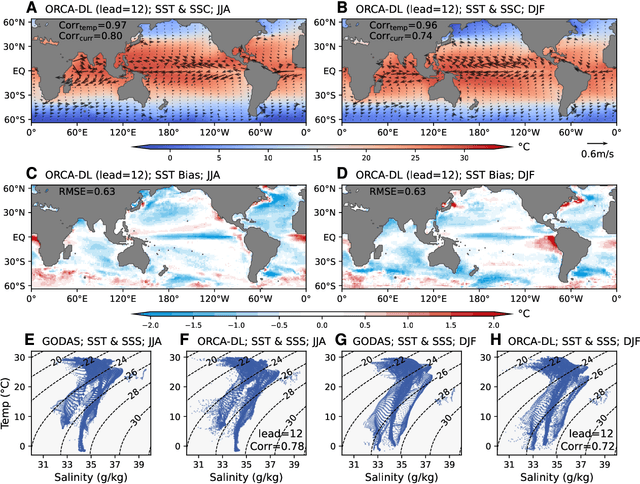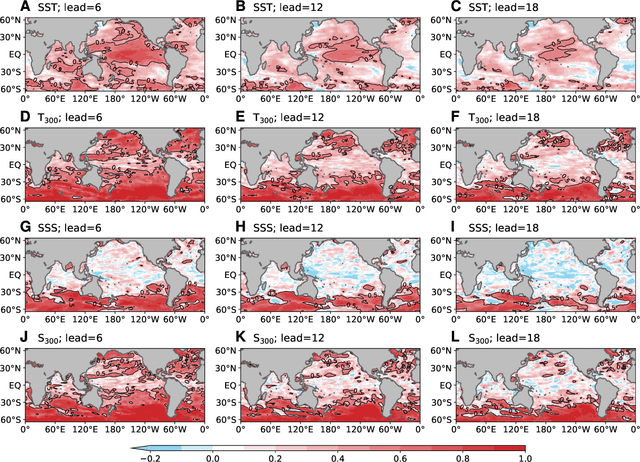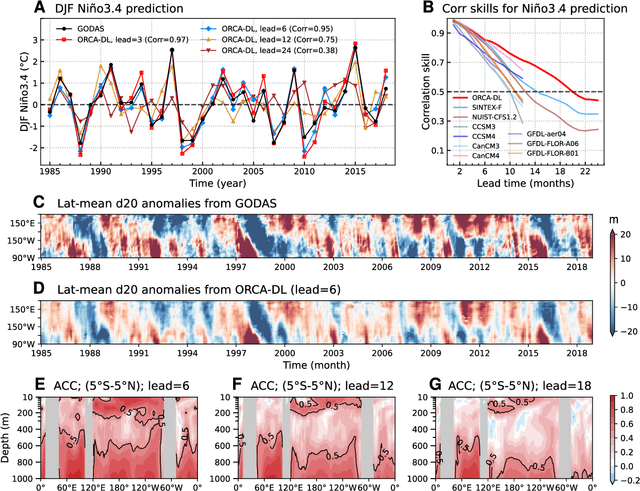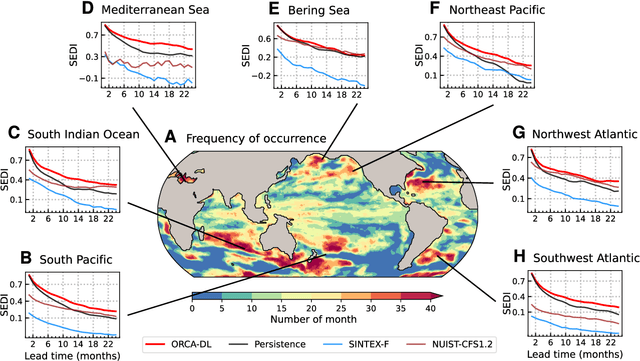Zijie Guo
Probing Scientific General Intelligence of LLMs with Scientist-Aligned Workflows
Dec 18, 2025Abstract:Despite advances in scientific AI, a coherent framework for Scientific General Intelligence (SGI)-the ability to autonomously conceive, investigate, and reason across scientific domains-remains lacking. We present an operational SGI definition grounded in the Practical Inquiry Model (PIM: Deliberation, Conception, Action, Perception) and operationalize it via four scientist-aligned tasks: deep research, idea generation, dry/wet experiments, and experimental reasoning. SGI-Bench comprises over 1,000 expert-curated, cross-disciplinary samples inspired by Science's 125 Big Questions, enabling systematic evaluation of state-of-the-art LLMs. Results reveal gaps: low exact match (10--20%) in deep research despite step-level alignment; ideas lacking feasibility and detail; high code executability but low execution result accuracy in dry experiments; low sequence fidelity in wet protocols; and persistent multimodal comparative-reasoning challenges. We further introduce Test-Time Reinforcement Learning (TTRL), which optimizes retrieval-augmented novelty rewards at inference, enhancing hypothesis novelty without reference answer. Together, our PIM-grounded definition, workflow-centric benchmark, and empirical insights establish a foundation for AI systems that genuinely participate in scientific discovery.
IoDResearch: Deep Research on Private Heterogeneous Data via the Internet of Data
Oct 02, 2025



Abstract:The rapid growth of multi-source, heterogeneous, and multimodal scientific data has increasingly exposed the limitations of traditional data management. Most existing DeepResearch (DR) efforts focus primarily on web search while overlooking local private data. Consequently, these frameworks exhibit low retrieval efficiency for private data and fail to comply with the FAIR principles, ultimately resulting in inefficiency and limited reusability. To this end, we propose IoDResearch (Internet of Data Research), a private data-centric Deep Research framework that operationalizes the Internet of Data paradigm. IoDResearch encapsulates heterogeneous resources as FAIR-compliant digital objects, and further refines them into atomic knowledge units and knowledge graphs, forming a heterogeneous graph index for multi-granularity retrieval. On top of this representation, a multi-agent system supports both reliable question answering and structured scientific report generation. Furthermore, we establish the IoD DeepResearch Benchmark to systematically evaluate both data representation and Deep Research capabilities in IoD scenarios. Experimental results on retrieval, QA, and report-writing tasks show that IoDResearch consistently surpasses representative RAG and Deep Research baselines. Overall, IoDResearch demonstrates the feasibility of private-data-centric Deep Research under the IoD paradigm, paving the way toward more trustworthy, reusable, and automated scientific discovery.
EarthLink: A Self-Evolving AI Agent for Climate Science
Jul 24, 2025


Abstract:Modern Earth science is at an inflection point. The vast, fragmented, and complex nature of Earth system data, coupled with increasingly sophisticated analytical demands, creates a significant bottleneck for rapid scientific discovery. Here we introduce EarthLink, the first AI agent designed as an interactive copilot for Earth scientists. It automates the end-to-end research workflow, from planning and code generation to multi-scenario analysis. Unlike static diagnostic tools, EarthLink can learn from user interaction, continuously refining its capabilities through a dynamic feedback loop. We validated its performance on a number of core scientific tasks of climate change, ranging from model-observation comparisons to the diagnosis of complex phenomena. In a multi-expert evaluation, EarthLink produced scientifically sound analyses and demonstrated an analytical competency that was rated as comparable to specific aspects of a human junior researcher's workflow. Additionally, its transparent, auditable workflows and natural language interface empower scientists to shift from laborious manual execution to strategic oversight and hypothesis generation. EarthLink marks a pivotal step towards an efficient, trustworthy, and collaborative paradigm for Earth system research in an era of accelerating global change. The system is accessible at our website https://earthlink.intern-ai.org.cn.
Scientists' First Exam: Probing Cognitive Abilities of MLLM via Perception, Understanding, and Reasoning
Jun 12, 2025Abstract:Scientific discoveries increasingly rely on complex multimodal reasoning based on information-intensive scientific data and domain-specific expertise. Empowered by expert-level scientific benchmarks, scientific Multimodal Large Language Models (MLLMs) hold the potential to significantly enhance this discovery process in realistic workflows. However, current scientific benchmarks mostly focus on evaluating the knowledge understanding capabilities of MLLMs, leading to an inadequate assessment of their perception and reasoning abilities. To address this gap, we present the Scientists' First Exam (SFE) benchmark, designed to evaluate the scientific cognitive capacities of MLLMs through three interconnected levels: scientific signal perception, scientific attribute understanding, scientific comparative reasoning. Specifically, SFE comprises 830 expert-verified VQA pairs across three question types, spanning 66 multimodal tasks across five high-value disciplines. Extensive experiments reveal that current state-of-the-art GPT-o3 and InternVL-3 achieve only 34.08% and 26.52% on SFE, highlighting significant room for MLLMs to improve in scientific realms. We hope the insights obtained in SFE will facilitate further developments in AI-enhanced scientific discoveries.
OmniEarth-Bench: Towards Holistic Evaluation of Earth's Six Spheres and Cross-Spheres Interactions with Multimodal Observational Earth Data
May 29, 2025Abstract:Existing benchmarks for Earth science multimodal learning exhibit critical limitations in systematic coverage of geosystem components and cross-sphere interactions, often constrained to isolated subsystems (only in Human-activities sphere or atmosphere) with limited evaluation dimensions (less than 16 tasks). To address these gaps, we introduce OmniEarth-Bench, the first comprehensive multimodal benchmark spanning all six Earth science spheres (atmosphere, lithosphere, Oceansphere, cryosphere, biosphere and Human-activities sphere) and cross-spheres with one hundred expert-curated evaluation dimensions. Leveraging observational data from satellite sensors and in-situ measurements, OmniEarth-Bench integrates 29,779 annotations across four tiers: perception, general reasoning, scientific knowledge reasoning and chain-of-thought (CoT) reasoning. This involves the efforts of 2-5 experts per sphere to establish authoritative evaluation dimensions and curate relevant observational datasets, 40 crowd-sourcing annotators to assist experts for annotations, and finally, OmniEarth-Bench is validated via hybrid expert-crowd workflows to reduce label ambiguity. Experiments on 9 state-of-the-art MLLMs reveal that even the most advanced models struggle with our benchmarks, where none of them reach 35\% accuracy. Especially, in some cross-spheres tasks, the performance of leading models like GPT-4o drops to 0.0\%. OmniEarth-Bench sets a new standard for geosystem-aware AI, advancing both scientific discovery and practical applications in environmental monitoring and disaster prediction. The dataset, source code, and trained models were released.
ORCA: A Global Ocean Emulator for Multi-year to Decadal Predictions
May 24, 2024



Abstract:Ocean dynamics plays a crucial role in driving global weather and climate patterns. Accurate and efficient modeling of ocean dynamics is essential for improved understanding of complex ocean circulation and processes, for predicting climate variations and their associated teleconnections, and for addressing the challenges of climate change. While great efforts have been made to improve numerical Ocean General Circulation Models (OGCMs), accurate forecasting of global oceanic variations for multi-year remains to be a long-standing challenge. Here, we introduce ORCA (Oceanic Reliable foreCAst), the first data-driven model predicting global ocean circulation from multi-year to decadal time scales. ORCA accurately simulates the three-dimensional circulations and dynamics of the global ocean with high physical consistency. Hindcasts of key oceanic variables demonstrate ORCA's remarkable prediction skills in predicting ocean variations compared with state-of-the-art numerical OGCMs and abilities in capturing occurrences of extreme events at the subsurface ocean and ENSO vertical patterns. These results demonstrate the potential of data-driven ocean models for providing cheap, efficient, and accurate global ocean modeling and prediction. Moreover, ORCA stably and faithfully emulates ocean dynamics at decadal timescales, demonstrating its potential even for climate projections. The model will be available at https://github.com/OpenEarthLab/ORCA.
Long-range Dependency based Multi-Layer Perceptron for Heterogeneous Information Networks
Jul 17, 2023Abstract:Existing heterogeneous graph neural networks (HGNNs) have achieved great success in utilizing the rich semantic information in heterogeneous information networks (HINs). However, few works have delved into the utilization of long-range dependencies in HINs, which is extremely valuable as many real-world HINs are sparse, and each node has only a few directly connected neighbors. Although some HGNNs can utilize distant neighbors by stacking multiple layers or leveraging long meta-paths, the exponentially increased number of nodes in the receptive field or the number of meta-paths incurs high computation and memory costs. To address these issues, we investigate the importance of different meta-paths and propose Long-range Dependency based Multi-Layer Perceptron (LDMLP). Specifically, to solve the high-cost problem of leveraging long-range dependencies, LDMLP adopts a search stage to discover effective meta-paths automatically, reducing the exponentially increased number of meta-paths to a constant. To avoid the influence of specific modules on search results, LDMLP utilizes a simple architecture with only multi-layer perceptions in the search stage, improving the generalization of searched meta-paths. As a result, the searched meta-paths not only perform well in LDMLP but also enable other HGNNs like HAN and SeHGNN to perform better. Extensive experiments on eight heterogeneous datasets demonstrate that LDMLP achieves state-of-the-art performance while enjoying high efficiency and generalization, especially on sparse HINs.
 Add to Chrome
Add to Chrome Add to Firefox
Add to Firefox Add to Edge
Add to Edge